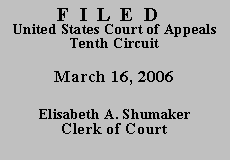

v.
RANDALL WORKMAN, sued as:
Randy
RICHARD EWALT,
Mr. Ewalt was convicted by a jury in Oklahoma state court of second degree murder (Count 1) and use of a vehicle to facilitate discharge of a weapon (Count 2) in violation of Okla. Stat. tit. 21 §§ 701.8(1) and 652(B), respectively. He was sentenced to life imprisonment for Count 1 and twenty years imprisonment for Count 2. The sentences were ordered to run concurrently. The conviction stemmed from the August 1996 fatal shooting of Jesus Siguala.
Mr. Ewalt appealed his convictions and sentences. On appeal, he argued that (1) the trial court erred by improperly instructing the jury that second-degree murder was a lesser included offense of first degree murder, the crime he was charged with; (2) he was acting in self-defense, and defense counsel was ineffective for failing to request a self-defense instruction; (3) the sentence for use of a vehicle to facilitate discharge of a weapon should be vacated because the State dismissed the charge following the trial; (4) the trial court erred by not allowing jurors to take notes; and (5) his conviction for use of a vehicle to facilitate discharge of a weapon was not supported by competent evidence. The Oklahoma Court of Criminal Appeals (OCCA) affirmed Mr. Ewalt's convictions and sentences, R. Doc. 1 Attach.; Doc. 9 Ex. C, and subsequently denied his petition for rehearing.
Mr. Ewalt then filed his federal habeas petition pursuant to 28 U.S.C. § 2254. In it, he raised three issues as follows: (1) his conviction for second degree murder, a crime with which he was never charged, violates due process and the OCCA's ruling that second degree murder is a lesser included offense of first degree murder violates the principle against ex post facto laws; (2) he was acting in self-defense, the two convictions were based on insufficient evidence, and defense counsel was ineffective for failing to request a self-defense instruction; and (3) his conviction for use of a vehicle to facilitate discharge of a weapon is not supported by competent evidence.
The district court carefully considered each of Mr. Ewalt's claims but denied relief as to all of them. R. Doc. 14. In order for this court to grant a COA, Mr. Ewalt must make "a substantial showing of the denial of a constitutional right." 28 U.S.C. § 2253(c)(2). Where, as here, the district court has rejected a habeas petitioner's constitutional claims on the merits, the petitioner must demonstrate that "reasonable jurists would find the district court's assessment of the constitutional claims debatable or wrong." Slack, 529 U.S. at 484.
Citing Williams v. Taylor, 529 U.S. 362, 402 (2000), the district court recognized that the claims asserted by Mr. Ewalt were presented to the OCCA and denied by that court. As such, the district court could not properly issue a writ of habeas corpus unless it found that the state court adjudication resulted in a decision that "was contrary to, or involved an unreasonable application of, clearly established Federal law, as determined by the Supreme Court of the United States; or . . . was based on an unreasonable determination of the facts in light of the evidence presented at the State court proceeding." 28 U.S.C. § 2254(d)(1)-(2); Jackson v. Ray, 390 F.3d 1254, 1259 (10th Cir. 2004). Federal courts evaluating § 2254 petitions must presume that state court factual findings are correct. See 28 U.S.C. § 2254(e)(1); see also Miller-El v. Cockrell, 537 U.S. 322, 340 (2003). The habeas petitioner bears the burden of rebutting that presumption by clear and convincing evidence. See 28 U.S.C. § 2254(e)(1); see also, e.g., Darks v. Mullin, 327 F.3d 1001, 1007 (10th Cir.), cert denied, 540 U.S. 968 (2003). It is against these standards that the district court's denial of Mr. Ewalt's petition must be assessed.
Having carefully reviewed his arguments, the OCCA's opinion, the district court's thorough order rejecting the claims, and the record on appeal, we conclude that reasonable jurists would not find the district court's resolution of the issues raised by Mr. Ewalt fairly debatable. We conclude, therefore, that Mr. Ewalt has not made "a substantial showing of the denial of a constitutional right." 28 U.S.C. § 2253(c)(2); Slack, 529 U.S. at 483-84.
Accordingly, we DENY a COA and DISMISS this appeal.
Entered for the Court
Paul J. Kelly, Jr.
Circuit Judge